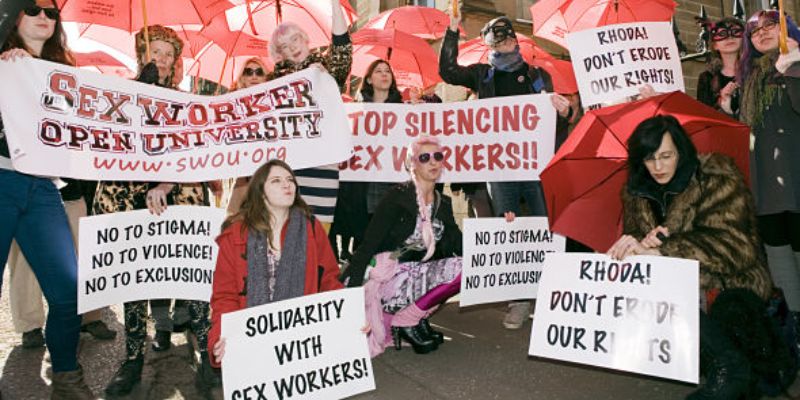Sex work is a controversial and stigmatized industry that involves individuals providing sexual services in exchange for money or other forms of compensation. Despite being widely recognized as one of the oldest professions in the world, sex work is often criminalized and marginalized in many countries. In this essay, we will explore the various issues related to sex work and its impact on society.
Sex work is often viewed as a form of exploitation or violence against women, with many arguing that it perpetuates gender inequality and promotes a culture of objectification and commodification of women’s bodies. However, there is also evidence that many sex workers choose this profession voluntarily and view it as a means of supporting themselves and their families. In addition, there are many instances where sex workers are subject to violence, abuse, and discrimination, often due to their marginalized status.
The criminalization of sex work has significant implications for the health and safety of sex workers. Criminalizing sex work means that sex workers often work in unsafe and unregulated environments, which can increase their risk of exposure to sexually transmitted infections, violence, and exploitation. Decriminalizing sex work has been shown to improve the health and safety of sex workers by allowing them to access healthcare services and work in safer environments.
Furthermore, sex work is often linked to broader social issues, such as poverty, migration, and drug use. Many sex workers come from marginalized communities and face multiple forms of discrimination, including discrimination based on their race, gender identity, and sexual orientation. Addressing these underlying social determinants of sex work is critical to ensuring that sex workers can live healthy and fulfilling lives.
In recent years, there has been a growing recognition of the need to address the rights of sex workers and to promote policies that protect their health and safety. Organizations such as the World Health Organization (WHO) have called for the decriminalization of sex work and the provision of comprehensive health services for sex workers. The COVID-19 pandemic has also highlighted the vulnerability of sex workers, as many have lost their livelihoods and are unable to access healthcare services during the pandemic.
In conclusion, sex work is a complex issue that involves issues of gender inequality, exploitation, and health and safety. Criminalizing sex work can have negative consequences for the health and safety of sex workers and perpetuate social inequalities. By prioritizing the rights and health of sex workers, we can work towards creating a more equitable and just society for all.
According to a report by the World Health Organization, sex workers face a significantly higher risk of exposure to HIV and other sexually transmitted infections (STIs) compared to the general population. In 2019, an estimated 63% of sex workers globally were living with HIV, with the highest prevalence rates in sub-Saharan Africa and Southeast Asia.
The same report highlights the importance of providing sex workers with access to prevention and treatment services, including condoms, HIV testing and counseling, and STI screening and treatment. It notes that sex workers who have access to these services have a lower risk of acquiring and transmitting HIV and other STIs.
Another statistic to consider is the number of sex workers who experience violence and discrimination. A study by the Global Network of Sex Work Projects found that nearly half of sex workers surveyed had experienced physical or sexual violence, and almost 70% had experienced verbal or physical harassment. This highlights the urgent need for policies and interventions to protect the human rights of sex workers and address the stigma and discrimination they face.
It is also important to note that the criminalization of sex work can exacerbate these issues. Sex workers who operate in illegal or underground markets may face increased risks of violence, exploitation, and discrimination, as well as reduced access to health and social services. Evidence suggests that decriminalization and regulation of sex work can help to promote the health and safety of sex workers and reduce the harms associated with their work.
Advantages of sex work can include financial benefits, flexibility of work hours, and the ability to work independently or with a chosen partner. Sex work can provide an income source for individuals who may have limited access to other forms of employment, such as those without legal status or who face discrimination in the job market.
However, there are also significant disadvantages and risks associated with sex work. One major concern is the potential for exposure to sexually transmitted infections (STIs), including HIV. Sex workers may also face violence, exploitation, and discrimination from clients, law enforcement, and society at large. In many countries, sex work is criminalized, which can further exacerbate these risks and lead to arrest, imprisonment, or deportation for sex workers.
Another challenge for sex workers is the lack of legal protections and labor rights. Many sex workers operate in illegal or underground markets, without access to basic protections such as minimum wage laws or workers’ compensation. This can make it difficult to negotiate safe working conditions, and leave sex workers vulnerable to exploitation and abuse.
It is important to note that the risks and disadvantages of sex work are often linked to the criminalization and stigmatization of the industry. Evidence suggests that decriminalization and regulation of sex work can help to promote the health and safety of sex workers and reduce the harms associated with their work. This includes ensuring access to healthcare, legal protections, and labor rights, as well as addressing the social and economic inequalities that can drive individuals towards sex work in the first place.




